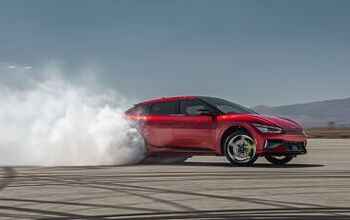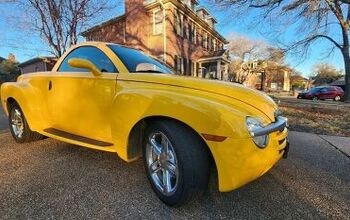Mercedes Charts Electric Course for Vans, Bringing Luxocruisers Stateside

If you’ve travelled abroad and marveled at rigs like the factory-built luxury vans (that aren’t industrial-grade Sprinters) tasked with shuttling and chauffeuring, you may be interested to learn Mercedes-Benz is planning to sell such machines in America. In addition to setting its sights on that relatively untapped market in this neck of the woods, Stuttgart is readying the roll-out of its all-electric van architecture.
First, the people carriers. Mercedes-Benz refers to them as “privately positioned midsize luxury vans”, referring not to the position of ones privates whilst driving the things but rather the intent of these vans to serve as luxury transportation for humans. This differs from converted Sprinter vans, some of which have sumptuous interiors but retain the underpinnings of a utilitarian machine designed to move cargo. On certain roads, this is evident.
During overseas hops, we’ve ridden in numerous examples of the passenger vans Merc is planning to bring here and can tell you the difference between those rigs and a converted Sprinter is stark. It surely won’t take long for livery services and the like to fill their fleets with these vans, meaning we should expect to see them in the perpetually congested pickup/dropoff lanes at LAX in short order. Mercedes believes there is growth opportunity with the V-Class, and they’re probably correct.
Underpinning these efforts will be M-B’s new VAN.EA architecture, an all-electric platform that will find homes under private vans and cargo carriers alike. Merc has already been dabbling in this arena with the eSprinter (which is different from the V-Class), installing a 113-kWh battery in a pre-production example and driving the thing from Vegas to Long Beach without stopping to recharge on the 275-mile journey. Specifics on the VAN.EA platform will appear closer to its expected introduction in 2026.
While some will mutter about range and charging opportunities for long distance deliveries, the fact remains that – in large centers – many cargo vans and passenger vans find themselves in environs suited for all-electric driving. Being stuck in LA traffic means plenty of regeneration opportunities instead of idling away fuel stores, while the van’s downtime will likely coincide with off-peak grid hours when electricity is cheaper for charging. Sure, there are numerous companies whose vehicles are operating 24/7 (if the wheels ain’t moving, the van ain’t making money) but an all-electric van will absolutely be the right fit for some customers.
[Images: Mercedes-Benz]
Become a TTAC insider. Get the latest news, features, TTAC takes, and everything else that gets to the truth about cars first by subscribing to our newsletter.

Matthew buys, sells, fixes, & races cars. As a human index of auto & auction knowledge, he is fond of making money and offering loud opinions.
More by Matthew Guy
Latest Car Reviews
Read moreLatest Product Reviews
Read moreRecent Comments
- Teddyc73 As I asked earlier under another article, when did "segment" or "class" become "space"? Does using that term make one feel more sophisticated? If GM's products in other segments...I mean "space" is more profitable then sedans then why shouldn't they discontinue it.
- Robert Absolutely!!! I hate SUV's , I like the better gas milage and better ride and better handling!! Can't take a SUV 55mph into a highway exit ramp! I can in my Malibu and there's more than enough room for 5 and trunk is plenty big enough for me!
- Teddyc73 Since when did automakers or car companies become "OEM". Probably about the same time "segment" or "class" became "space". I wish there were more sedans. I would like an American sedan. However, as others have stated, if they don't sell in large enough quantities to be profitable the automakers...I mean, "OEMs" aren't going to build them. It's simple business.
- Varezhka I have still yet to see a Malibu on the road that didn't have a rental sticker. So yeah, GM probably lost money on every one they sold but kept it to boost their CAFE numbers.I'm personally happy that I no longer have to dread being "upgraded" to a Maxima or a Malibu anymore. And thankfully Altima is also on its way out.
- Tassos Under incompetent, affirmative action hire Mary Barra, GM has been shooting itself in the foot on a daily basis.Whether the Malibu cancellation has been one of these shootings is NOT obvious at all.GM should be run as a PROFITABLE BUSINESS and NOT as an outfit that satisfies everybody and his mother in law's pet preferences.IF the Malibu was UNPROFITABLE, it SHOULD be canceled.More generally, if its SEGMENT is Unprofitable, and HALF the makers cancel their midsize sedans, not only will it lead to the SURVIVAL OF THE FITTEST ones, but the survivors will obviously be more profitable if the LOSERS were kept being produced and the SMALL PIE of midsize sedans would yield slim pickings for every participant.SO NO, I APPROVE of the demise of the unprofitable Malibu, and hope Nissan does the same to the Altima, Hyundai with the SOnata, Mazda with the Mazda 6, and as many others as it takes to make the REMAINING players, like the Excellent, sporty Accord and the Bulletproof Reliable, cheap to maintain CAMRY, more profitable and affordable.



































Comments
Join the conversation
Minnesota > Stuttgart
V-Class looks good.